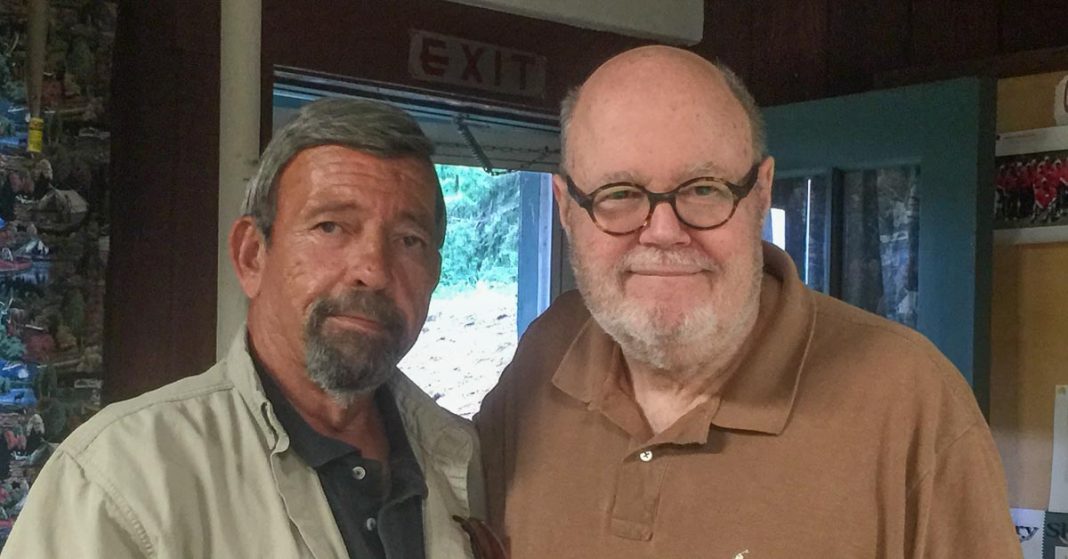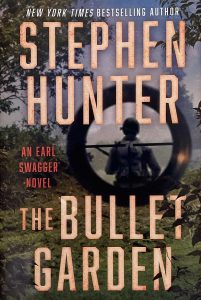I don’t read a lot of fiction, but I make an exception for the work of my friend Stephen Hunter, one of the very few gun-savvy novelists of our time. His latest is “The Bullet Garden,” the title referring to the bocage, the tangled environment of European hedgerows where American soldiers are advancing after D-Day. They are bogged down by a cadre of particularly deadly German snipers, so the Army heads to Parris Island where Earl Swagger, wounded after three island invasions, is now assigned to teach the M-1 Garand rifle to Marine recruits. Earl, the “WWII generation” of Steve’s family of good guy gunfighters, heads to Europe to solve the problem.
The complicated plot involves layer after layer of conflict. There’s Allies versus Nazis, of course, but also ally versus ally on many levels. Hunter explores the internecine rivalries of both nation-states and individuals jockeying for power and losing sight of more important goals. The reader’s emotions will be played with: you’ll come to like a couple of characters, and then have to watch them get killed.
Steve’s evocative writing skills have never been better displayed. Example: One character is a mild-mannered Jewish draftee who is uncertain of his capabilities, but in his first real combat with the Nazis rises to the occasion and destroys a German tank. A lesser novelist might have written, “…and then the panzer exploded.” But Stephen Hunter writes, “A stab of incandescence pierced the night as the turret of the beast twisted under the strength of the blast, seemed to rise a bit, then fell back, hopelessly askew. The proud gun was useless, smoke and some flame began to bleed from the wounded steel, the smell of burning rubber as the hoses melted in what turned into conflagration.”
I think you’ll enjoy it. Available on Amazon.




Ordered today. At your recommendation I have read the entire series or just about, anyway. They make for the perfect diversion from the stresses of the day.
Randy Kilgore
Have you ever thought of dipping your toe into the world of fiction writing Mas?
I don’t have the imagination for it, Richard. Some of the reality I have to write about is weirder than fiction anyway, in the “you can’t make this (stuff) up” category.
Mas, Richared is correct.. you DO have a way with words.
So you think you don’t have an imagination? Maybe true… but I’ve read enough of your writing on “reality” and yes, at times this IS sranger than fiction. wHAT if… you were to take some of these stranger than fiction tales, swap round names, places, motives, etc so they are no longer recogisable, then weave some of them together into a tall tale based on real life.
I rather suspect this is not a new Melville’s Moby Dick was no less than exactly that. The tale of that vessel is clealry taken out of the history of the similar whaler Essex, plying the same grounds on which he had sailed before the mast. Severalof his characters were easily recognised by men of that same time and place. Joseph Conrad is another. I am quite certain that at least some of Doyle’s wonderful work was at least suggsted or inspird by people, places, events he knew. Casey’s Sometime a Great Notion had origins in reality, as did One Flew Over the Cuckoo’s Nest. And I’ve long suspected Kubrick’s Clockwork Orange was based on reality. No one is crazy enough to dream up that kind of stuff. Not all of it, at any rate.
Something to entertain yourself when “yer dun shootin””
Leo Rosten said “Truth is stranger than fiction. Of course it is. Fiction has to be believable.”
I had an uncle in the Army infantry who survived a fusillade from a German machine gunner in the Normandy bocage, was basically cut in half, and yet survived, barely. The war against Hitler dragged on seemingly forever. How our infantry attacked into almost certain eventual death for years against the ambushing, diehard German troops should never be forgotten or undervalued. Our focus on accurate, deliberate shooting at a slower rate of fire, although often voluminous, vs. a general German penchant for more rapid massed area fire, surely seems to have won the day. The 155mm “rifle” artillery piece played a large role for us. A pistol-grip carbine model of the M1 Garand infantry rifle was eventually developed, but apparently never made it into mass production. I believe that I have read all of Stephen Hunter’s novels so far, and won’t miss this one.
I’ve read all ion Stephen Hunter’s Novels. I remember over 20 years ago working at Bill’s Gun Shop. All of us had read “Dirty White Boys.” We were just waiting for someone like the Pewty boys to come through the doors so we could pokerize them.
Always enjoyed his novels, respected his desire to get the details correct. He’s taken training courses to make sure of those details. Will look forward to reading his latest.
Regarding combat in the bocage, I was honored to talk at some length on a few occasions with a WWII British sniper and got some great insight into what that combat was like. He came ashore on D-Day and fought through the bocage and on across France into Germany, where he met his future wife in a small German village. As you say, Mas, some of the stories were of the “can’t make this stuff up” variety.
One of my uncles was in 82nd Airborne. He jumoed against Rommel in north Africa, hit before ht touched down. they scooped him up,, pathce him up, put him back together soon enough to jump again at Anzio. Same story, hit before he landed. Same plan as the last time. He was in one of the towed glider troop craft over Normandy. He jumped again, and third time got hit before he landed in that tree. They found him after daylight the next day, dragged him out and back to the States. He healed up, though he always had a hitch ih=n hisn giddyup. That only slowed him down a little bit. Growing up he was a key character and influence on me. We spent a lot of time together,, a lot of it working. He could figure out and DO just about anything to which he would set his hands. One time when I was a young man and dealing with some more grown-up type things, I asked him what the war was like. He got quiet, looked at me steadily, and declared “there are just some things a man doesn’t want to talk about”. I never raised the subject again, but wondered all the same.
I just finished it a few days ago. Well worth the time and money.
I had the honor of interviewing a 99-year-old vet who hit Normandy with a mortar unit and was on the pointy end of the spear all the way to Germany. Infantry units on the front would be rotated, but the mortars supporting them weren’t. His family liked my feature well enough to invite me to his 100th birthday party.
He hadn’t been able to talk about the war until he went on an Honor Flight visit to the beach, and looked up to see houses built all along the crest of the ridge they had to scale.
Have the book and waiting for the time to read it.
Looking forward to it. I’d like to see him look back in time and see what the Swaggers were doing in WWI or the Spanish-American war. Few WWII vets left and even the Vietnam vets I served with are pushing 70 now.
I absolutely agree that S. Hunter’s novels are excellent reads and technically accurate in respects to firearms.
For another author who does know his guns, try James Tarr (Firearms News Handguns editor).
My first exposure was Dog Soldiers, then the 2-novel set of Whorl / Waiting for the Kick, then the 3-novel set Failure Drill / Splashback / Splits and Transitions.
Latest in my reads are Bestiarii (Echoes of Pangaea Book 1) / Fire and Bones (Echoes of Pangaea Book 2) / The Ghosts of Xicotepec (Echoes of Pangaea Book 3).
All excellent.
If you want a suggestion on books to avoid because of the frustrations caused by the author’s ignorance of firearms, anything by Lee Child (the Reacher series).
I’ll second you on Jim Tarr. I know him: a Grandmaster pistol shooter in active competition, and a very sharp guy. If memory serves, I did a review on some of his fiction here on the blog a few years back. Folks, check out Tarr’s stuff on Amazon.
Best,
Mas
I’ve been read Stephen Hunter since he was still a movie critic at the Baltimore newspaper…. Love his work!!!! I’ve read “Point of Impact at least 3 times….
Comments are closed.